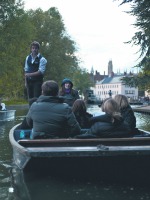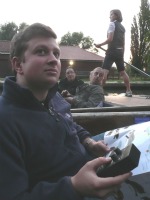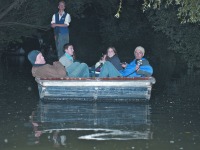Reviewed: Bat Punting Safari, Cambridge
Punting on the river Cam is a Cambridge institution, and Jonny Payne finds the perfect excuse to be chauffeured along the river on a warm summer’s evening as he goes on a ‘bat safari’ in search of some of Britain’s most misrepresented creatures.
The air is still and there’s a feeling of serenity on the river Cam as our punting chauffeur gently cajoles us along on this balmy summer evening in Cambridge. Reclining in the ample space on the flat-bottomed boat, there’s a real sense of Englishness as we take part in a time-honoured tradition in one of the country’s most historic university cities.
 Enjoy the view of Cambridge colleges as you glide down the river
Enjoy the view of Cambridge colleges as you glide down the riverScudamore’s Punting Company
As we float down the river past a talented group of new graduates posing in gowns for pictures with proud parents, it’s easy to forget the stresses of the working week – this being a Friday night, it seems the perfect low-key start to the weekend.
We pass groups of students on punts (some rather bedraggled from unexpected dips in the river), families traversing the river on canoes and young couples strolling along the riverside as pairs of swifts flutter overhead.
But these nimble, fork-tailed birds don’t have this quiet setting to themselves. We’re soon about to see some bats, or so we hope. I’m on a ‘bat safari’ with an expert, David, and a group of observers ranging from bat fanatics to those with a passing interest in the big-eared and often maligned flying mammals. Scudamore’s Punting Company have organised the Punting Bat Safaris in recognition of 2011 being the year of the bat, and have enlisted the help of local experts in partnership with The Wildlife Trust.
 Listen out for telltale pips and buzzes on the bat detector
Listen out for telltale pips and buzzes on the bat detectorJonny Payne
David, who I had earlier mistaken for an over-eager customer due to his intense studying of some bat recognition cards, now hands these booklets to the group, describing which bats we’re most likely to see during our 90-minute trip and how to spot them.
We’re told to look out for Common Pipistrelles, Soprano Pipistrelles and Daubenton’s, and there may also be a chance of seeing a high-flying Noctule. I leave the frenzied excitement to the enthusiasts sitting beside me, but can’t help but feel the anticipation building at the possibility of viewing these fascinating creatures up close.
David gives us all a bat detector, mine’s a Bat Box mark II, which tunes their sonar calls to a range that the human ear can hear. As each bat species emits different frequencies, we’re able to tell what’s overhead by tuning our receptors to certain ranges - the Soprano Pipistrelle at 55 kHz, Common Pipistrelles at 45 kHz and Noctule at 20 kHz. The Daubenton’s is easier to detect as it uses a wider range of frequencies.
 The Bat Box mark II is used to detect bats
The Bat Box mark II is used to detect batsScudamore’s Punting Company
Unfortunately my Bat Box doesn’t work as the battery has run out. Our guide doesn’t have a spare, so I share with a neighbour until the guide in the other boat comes to the rescue.
Despite David’s informative commentary, I was starting to forget about the bats 20 minutes into the trip as I was relaxing in the calm of the surrounds, but suddenly the receivers leap into life with pips and buzzes – there’s a bat nearby! The noise is only audible when we tune the receiver to 55 kHz, meaning it’s a Soprano Pipistrelle – and sure enough a rapidly flapping bat is circling overhead.
Soon there are more, both Soprano and Common Pipistrelles flying just above the riverbanks, and they appear far bigger than their tiny bodies suggest. But then there’s the most spectacular sight of the lot. A couple of larger Daubenton’s bats fly low past us, twisting and turning inches above the river in an attempt to catch insects hovering above the water – they’re almost within touching distance.
As nightfall gradually descends, we use torches to follow the bats as they swarm above the treetops, nestle amongst the long grass of the riverbanks and pass inches from the punt.
We soon float out of the area with the highest concentrations and 10 minutes later we turn around and head back upstream, where I hope to see the elusive Noctule. Soon we’re given hope as the distinctive ‘chip-chop’ sounds of the species can be heard on the receiver, but they soon fade into the night.
I was a little sceptical about the experience being branded a ‘safari’ before setting off, but I’m now starting to see why. Searching for the Noctule is like looking for one of the ‘Big Five’; but this is not a lion, a leopard or an elephant, it’s a tiny thumb-sized native of the United Kingdom.
 Groups as well as couples can enjoy a night time chauffeur-driven punt ride
Groups as well as couples can enjoy a night time chauffeur-driven punt rideScudamore’s Punting Company
Unfortunately the Noctule remains elusive, as the number of bats on the way back decreases and we’re gradually left to curl up in the warm blankets provided by the hosts. Our chauffeur, who has been impeccable until now, suddenly loses the pole, which sticks up in the middle of the river like a sprouting tree in a mangrove swamp. The oar that’s supposed to be in the punt as a back-up is nowhere to be seen, but fortunately our sister punt retrieves it as we float helplessly towards the riverbank, which I am told is home to mink and even the occasional otter.
The journey back seems rather long, and the 90-minute total time is a little drawn-out in my opinion, but it does give customers time to see bats if they’re not lucky enough to see them within minutes.
The ‘bat safari‘ is a great concept and certainly appeals to enthusiasts, overnight visitors and locals; but due to it being a late-evening activity (as bats only come out around dusk); you’ll most probably miss the last train back. But you’ll not often have the chance to spend a relaxing Friday night in the company of these furry and enthralling winged creatures.
Punting Bat Safaris – Scudamore’s Punting Company
Tel: (01223) 359 750.
www.scudamores.com/punting/combined/bat.php
Price: £15.00 (adults), £13.50 (concessions), £7.50 (children under 12) (50% of proceeds go to the Wildlife Trust)
Tours: Every Friday until 9 September 2011 (plus an additional date on Sunday 25 September 2011).
Do you have any Feedback about this page?
© 2026 Columbus Travel Media Ltd. All rights reserved. No part of this site may be reproduced without our written permission, click here for information on Columbus Content Solutions.









 You know where
You know where